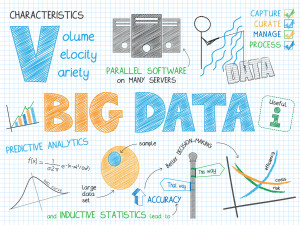One of the questions with emerging LIS career opportunities is how to retool your traditional library skills to bridge into these cool new career paths.
If you’re interested in data librarianship, I’d suggest your first move be to read Amy Affelt’s excellent The Accidental Data Scientist (Information Today, 2015). Consider Affelt’s book to be “everything you wanted to know about data librarianship but never would have had a clue to ask.”
Learning More
After you’ve read the book, however, you may be so intrigued that you decide it’s time to make a serious move in the direction of data librarianship. If so, you have several choices for mastering the requisite skill set. One way would be to try to find ways to learn on the job, if your current work situation lends itself to this option – is there someone who would be willing to mentor you or share their knowledge, and perhaps give you an opportunity to try out your developing skills on a volunteer or training basis?
A second approach would be to create your own independent learning path using commercial online course providers. Options here include (among others) Udacity (Data Science category), Coursera (Data Science, Big Data, Business Analytics), O’Reilly Media (Data, Programming), Learnquest (Data, Big Data), Udemy (Data, Analytics, Data Science Career Guide), CodeAcademy (multiple options), and Lynda.com (Big Data, Data Mining, Data Visualization). These providers offer popular and easily accessed options for targeted skills development, usually at a very reasonable price. But assume they’ll probably be focused on hardcore tech skills, with an assumption of at least a baseline of IT skills. If this fits you, and you’re a solid, self-motivated independent learner, these courses can provide a great learning solution.
The third approach would be to consider one of the degree, certificate, or concentration offerings being provided by MLIS and iSchool programs. Although these will probably be your most expensive alternative, they’ll also be speaking your language, and will help you focus your skills development in areas where the data librarians (rather than, for example, computer scientist) jobs are.
So who’s operating in this space? The following graduate programs offer a degree in data-related skills:
School of Informatics and Computing, Indiana University-Bloomington
Master of Science in Data Science
School of Information, University of California at Berkeley
Master of Information and Data Science
The following graduate programs offer certificates in data-related skills:
Graduate School of Library and Information Science, University of Illinois
Certificate of Advanced Study: Digital Libraries
School of Information Studies, Syracuse University
Certificate in Advanced Studies: Data Science
Library & Information Science, Dominican University
Certificates: Data and Knowledge Management, Informatics
School of Information, College of Communication & Information, Florida State University
Certificate: Information Architecture
School of Informatics and Computing, Indiana University-Bloomington
Certificates: Data Science, Information Architecture
School of Information and Library Science, University of North Carolina
Post Master’s Certificate: Data Curation
College of Information, Dept. of Library & Information Sciences, University of North Texas
Graduate Academic Certificate: Digital Curation and Data Management
School of Information Sciences, University of Pittsburgh
Certificate of Advanced Study: Big Data Analytics
School of Information, San Jose State University
Advanced Certificate: Digital Assets and Services – Data Analytics and Data Driven Decision Making
School of Information Studies, Syracuse University
Certificate of Advanced Study: Data Science
The following graduate programs offer degree concentrations or specializations in data-related skills:
Department of Information Studies, University of California at Los Angeles
Concentration: Informatics
Library & Information Science, Dominican University
Concentration: Analytics (MS in Information Management)
Graduate School of Library and Information Science, University of Illinois
Concentrations: Data Curation, Socio-Technical Data Analytics
School of Informatics and Computing, Indiana University-Bloomington
Concentrations: Data Science and Information Architecture (MIS and MLS)
School of Information and Library Science, University of North Carolina-Chapel Hill
Concentrations: Database Design and Development, Information System Design and Development (MSIS)
School of Information Sciences, University of Pittsburgh
Concentrations: Big Data Analytics, Database and Web Systems (MSIS)
School of Communication and Information, Rutgers
Concentrations: Data Science, Technology, Information, and Management (MI)
Faculty of Information, University of Toronto
Concentration: Knowledge Management & Information Management
Information School, University of Washington
Specializations: Data Science, Information Architecture (MSIM)
[Note: inclusion in this list does not imply an endorsement of any of these programs.]
Almost all of these programs offer at least some part (if not all) of their courses online. In addition, a number of the schools also offer “one-off” webinars on specific aspects of data librarianship, although given the complexity of data librarianship work, these should probably be considered more introductory than at a skills-mastery level.
If data librarianship sounds like it might appeal to you, don’t let the fact that you’d need to pick up new knowledge slow you down – there are plenty of options to master the skills you need.

